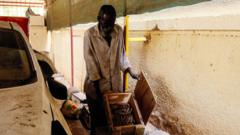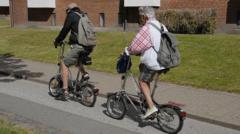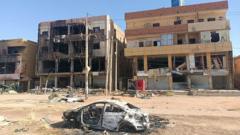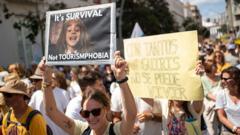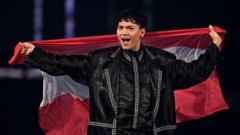The situation in Idlib, Syria, under the control of Hayat Tahrir al-Sham (HTS), reveals a delicate balance between governance and past authoritarianism. While improvements and some freedoms emerged after the fall of Assad, growing concerns about HTS's potential authoritarian rule persist among residents and activists.
Navigating Rebel Rule: Life in Post-Assad Idlib
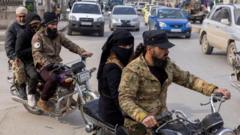
Navigating Rebel Rule: Life in Post-Assad Idlib
An in-depth exploration of how life in Idlib has transformed under the Islamist group Hayat Tahrir al-Sham, illustrating the complex dynamics of governance, freedom, and community resilience.
In the picturesque landscape of Idlib, northwest Syria, remnants of a violent past linger as a testament to a protracted civil war. Here, the Islamist group Hayat Tahrir al-Sham (HTS) has carved out a domain since 2017, creating an environment of stability in a country torn apart by conflict. The region, once the only opposition-held territory, has transformed following the ousting of Bashar al-Assad, a shift that has made HTS a significant authority, attempting to reshape Syria's future.
Public spaces in Idlib display vibrant opposition flags and spirited graffiti that celebrate the community’s battle against Assad's regime. Yet, the scars of war remain present among the newly opened businesses and renovated infrastructure, showcasing a contradictory narrative of progress and trauma. Dr. Hamza Almoraweh highlights the stark contrasts between past neglect under Assad and current developments, asserting that Idlib has improved significantly in recent years.
HTS, which has historical roots in al-Qaeda, is actively rebranding itself as a pivotal nationalist force committed to fostering national unity. Despite attempts to shed a jihadist image, the group has been designated a terrorist organization by the US and various international bodies. Nevertheless, the administration dubbed the 'Salvation Government' operates public services — from utilities to infrastructure — funded by taxes levied on the local populace.
The organization’s recent moderation, including the easing of stringent social policies, suggests a shift towards international acceptance amid local disquiet. Activist Fuad Sayedissa acknowledges this cautious liberalization, but he cautions that while there is an observable increase in freedoms, authoritarian tendencies persist, particularly in HTS’s consolidation of power.
Demonstrations arise sporadically against excessive taxation and perceived stricture, indicating a society still navigating the complexities of newfound governance. Residents express mixed feelings about HTS’s rule; while there are reduced fears for personal safety compared to the Assad era, there remains wariness towards the group's long-term intentions. For many, the optimism tied to Assad's downfall is tempered by genuine concerns regarding potential oppression under HTS, signaling that the path forward is fraught with uncertainty.
In further evidence of the societal complexities, a shift has emerged within minority communities. Friar Fadi Azar, a local Christian leader, describes a relative newfound freedom post-Assad. However, he still grapples with a nuanced mistrust of HTS, questioning the sincerity of their outreach towards religious minorities.
As the region adapts to rapid changes, many locals aspire for a form of governance that respects freedoms while eschewing dictatorship. The age-old reminder that power can corrupt looms large in the collective consciousness. While there's a current semblance of stability, the future of rebel rule in Idlib, and by extension Syria, remains an open and contentious question, inevitably shaped by the interplay of local aspirations and broader geopolitical realities.
Public spaces in Idlib display vibrant opposition flags and spirited graffiti that celebrate the community’s battle against Assad's regime. Yet, the scars of war remain present among the newly opened businesses and renovated infrastructure, showcasing a contradictory narrative of progress and trauma. Dr. Hamza Almoraweh highlights the stark contrasts between past neglect under Assad and current developments, asserting that Idlib has improved significantly in recent years.
HTS, which has historical roots in al-Qaeda, is actively rebranding itself as a pivotal nationalist force committed to fostering national unity. Despite attempts to shed a jihadist image, the group has been designated a terrorist organization by the US and various international bodies. Nevertheless, the administration dubbed the 'Salvation Government' operates public services — from utilities to infrastructure — funded by taxes levied on the local populace.
The organization’s recent moderation, including the easing of stringent social policies, suggests a shift towards international acceptance amid local disquiet. Activist Fuad Sayedissa acknowledges this cautious liberalization, but he cautions that while there is an observable increase in freedoms, authoritarian tendencies persist, particularly in HTS’s consolidation of power.
Demonstrations arise sporadically against excessive taxation and perceived stricture, indicating a society still navigating the complexities of newfound governance. Residents express mixed feelings about HTS’s rule; while there are reduced fears for personal safety compared to the Assad era, there remains wariness towards the group's long-term intentions. For many, the optimism tied to Assad's downfall is tempered by genuine concerns regarding potential oppression under HTS, signaling that the path forward is fraught with uncertainty.
In further evidence of the societal complexities, a shift has emerged within minority communities. Friar Fadi Azar, a local Christian leader, describes a relative newfound freedom post-Assad. However, he still grapples with a nuanced mistrust of HTS, questioning the sincerity of their outreach towards religious minorities.
As the region adapts to rapid changes, many locals aspire for a form of governance that respects freedoms while eschewing dictatorship. The age-old reminder that power can corrupt looms large in the collective consciousness. While there's a current semblance of stability, the future of rebel rule in Idlib, and by extension Syria, remains an open and contentious question, inevitably shaped by the interplay of local aspirations and broader geopolitical realities.


